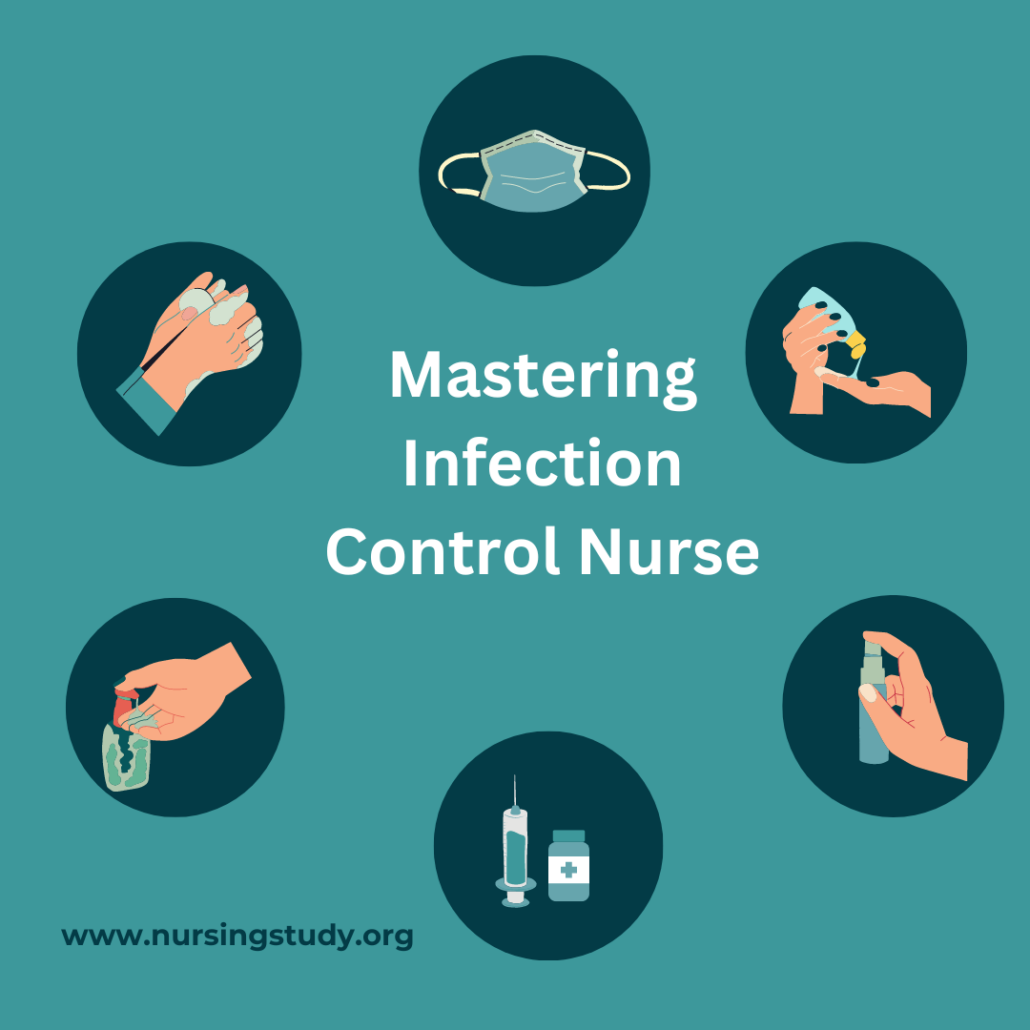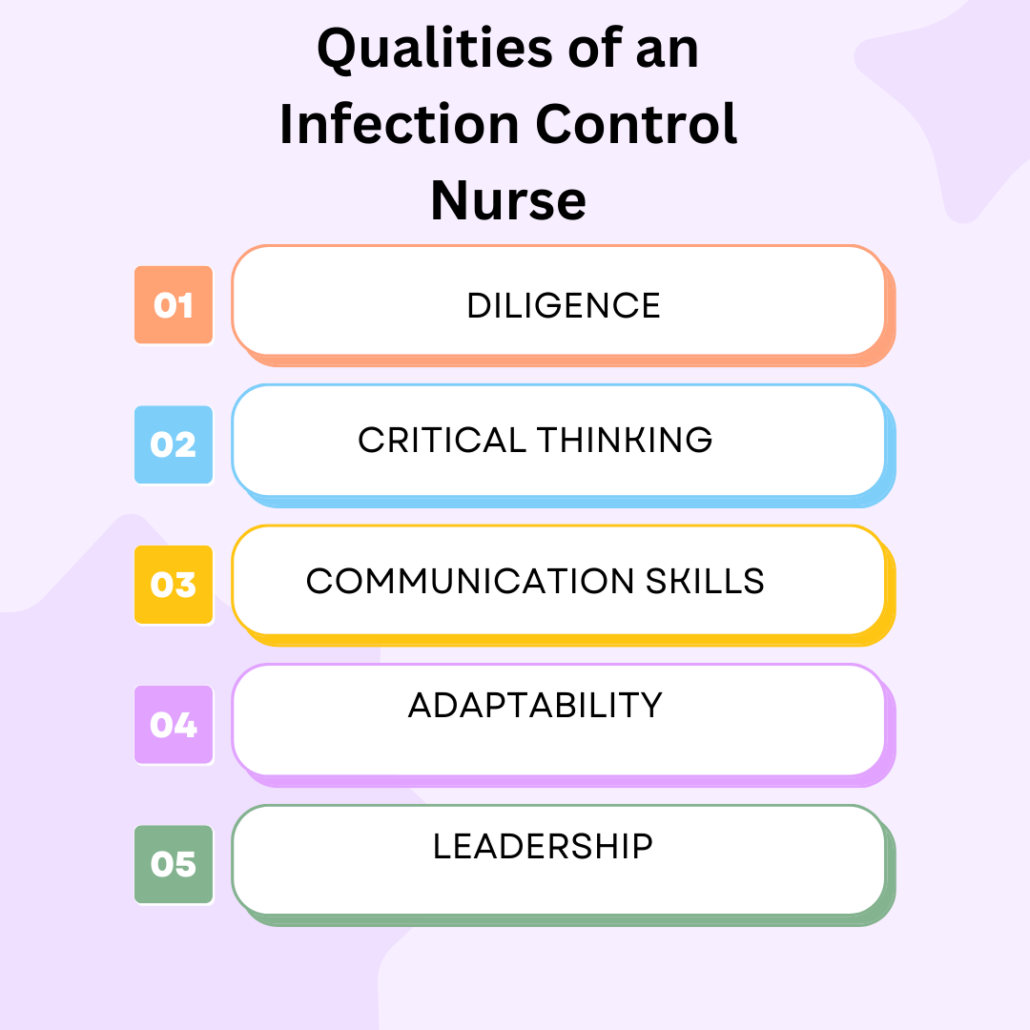Interested in becoming an Infection Control Nurse? This comprehensive article covers everything you need to know about this specialized nursing role, including educational requirements, certification, job duties, salary, career outlook, and more.

Who is an Infection Control Nurse?
An Infection Control Nurse is a specialized healthcare professional responsible for preventing and controlling the spread of infections within healthcare facilities. They are experts in infection prevention practices, epidemiology, and infectious diseases.
Infection Control Nurses work closely with other healthcare team members to develop and implement infection control protocols, conduct surveillance for infections, and educate staff and patients on proper infection prevention measures.
How Long Does it Take to Become an Infection Control Nurse?
Becoming an Infection Control Nurse typically requires a combination of education and experience. The path to this role varies, but it generally involves completing a nursing degree program (usually a Bachelor of Science in Nursing) and gaining experience as a registered nurse (RN).
Additionally, pursuing specialized education or certification in infection control is often necessary. Overall, the process can take several years, depending on individual career goals and educational pathways.
What Does an Infection Control Nurse Do?
Infection Control Nurses are responsible for a range of duties aimed at preventing and managing infections within healthcare settings. These duties may include conducting infection surveillance, implementing infection control protocols, educating staff and patients on infection prevention measures, investigating outbreaks, and collaborating with other healthcare professionals to develop and implement infection control strategies.
Additionally, they play a crucial role in promoting a culture of safety and adherence to infection control guidelines throughout the healthcare facility.
How to Become an Infection Control Nurse
Becoming an Infection Control Nurse requires a combination of education, experience, and specialized training.
The first step is to complete a nursing degree program and obtain licensure as a registered nurse (RN). From there, gaining experience in infection control or related areas is essential.
Many Nurses pursue additional education or certification in infection control to enhance their knowledge and skills in this specialized field. Networking with professionals in the field and seeking mentorship opportunities can also be beneficial.
Educational Requirements for an Infection Control Nurse
The educational requirements for becoming an Infection Control Nurse typically include completing a nursing degree program from an accredited institution. This may be a Bachelor of Science in Nursing (BSN) or an Associate Degree in Nursing (ADN), followed by obtaining licensure as a registered nurse (RN).
In addition to basic nursing education, aspiring Infection Control Nurses may need to pursue specialized education or certification in infection control, epidemiology, or related fields. Continuing education is often required to maintain certification and stay up-to-date with advances in infection control practices.
Infection Control Nurse Certification and Exam Requirements
Certification in infection control is often required or preferred for Infection Control Nurses. The most widely recognized certification for infection control professionals is the Certification in Infection Control (CIC) offered by the Certification Board of Infection Control and Epidemiology (CBIC).
To become certified, candidates must meet eligibility requirements, which typically include a combination of education and experience, and pass a comprehensive examination. Maintaining certification requires ongoing education and adherence to recertification requirements.
Where Does an Infection Control Nurse Work?
Infection Control Nurses can work in various healthcare settings, including hospitals, long-term care facilities, clinics, ambulatory care centers, and public health agencies.
They may also work in non-traditional settings such as research institutions, pharmaceutical companies, or consulting firms specializing in infection control and epidemiology.
The specific duties and responsibilities of an Infection Control Nurse may vary depending on the setting in which they work.
What is the Infection Control Nurse Career Outlook and Career Growth?
The demand is expected to remain strong due to the increasing focus on infection prevention and control in healthcare settings.
As healthcare facilities strive to reduce healthcare-associated infections and respond to emerging infectious diseases, the need for skilled infection control professionals is likely to grow.
Infection Control Nurses may also have opportunities for career advancement into leadership roles or specialized areas of practice within infection control or nursing management.
What Are the Qualities of an Infection Control Nurse?

- Diligence: Infection Control Nurses must be meticulous in their work, paying close attention to detail to ensure that infection control protocols are followed rigorously.
- Critical Thinking: They need to be able to assess situations quickly and make informed decisions to prevent the spread of infections.
- Communication Skills: Effective communication is essential for educating staff and patients about infection control measures and for collaborating with other healthcare professionals.
- Adaptability: Infection Control Nurses must be able to adapt to changing circumstances, such as outbreaks or new infection control guidelines, to protect patients and staff.
- Leadership: They often take on leadership roles in developing and implementing infection control policies, requiring strong leadership skills to guide and motivate others.
Are There Any Online Programs to Become an Infection Control Nurse?
Several online programs offer education and training in infection control for nurses and healthcare professionals. These programs may include courses on infection prevention and control, epidemiology, microbiology, and related topics.
However, it’s important to ensure that any online program chosen is accredited and meets the requirements for certification or licensure in infection control.
What is the Salary of an Infection Control Nurse?
The salary of an Infection Control Nurse can vary depending on factors such as location, level of experience, education, and the type of healthcare setting.
According to the Bureau of Labor Statistics (BLS), the median annual wage for registered nurses, including those specializing in infection control, was $75,330 as of May 2020.
However, salaries for Infection Control Nurses may be higher in certain regions or healthcare facilities, particularly those with a high demand for infection control expertise.
How Do Infection Control Nurses Transition to Other Nursing Positions?
Infection Control Nurses may transition to other nursing positions by gaining additional education, training, or certification in their desired specialty area. For example, an Infection Control Nurse interested in pursuing a leadership role may pursue a Master of Science in Nursing (MSN) degree with a focus on nursing administration or healthcare management.
Networking with professionals in the desired specialty area and seeking out mentorship opportunities can also help facilitate a successful transition.
5 Advantages to Becoming an Infection Control Nurse and 5 Disadvantages to Becoming an Infection Control Nurse
Advantages:
- Opportunities for professional growth and advancement
- Contribution to patient safety and infection prevention
- Diverse career options in various healthcare settings
- High demand for skilled infection control professionals
- Competitive salaries and benefits
Disadvantages:
- Intensive workload and high-pressure environment
- Exposure to infectious diseases and occupational hazards
- Ongoing education and certification requirements
- Limited opportunities for direct patient care and interaction
- Challenges in implementing infection control protocols and practices
Infection Control Nurse Roles and Responsibilities
Roles and responsibilities of an Infection Control Nurse may include:
- Conducting infection surveillance and outbreak investigations
- Developing and implementing infection control policies and procedures
- Educating staff and patients on infection prevention measures
- Collaborating with interdisciplinary teams to promote infection control practices
- Monitoring compliance with infection control guidelines and regulations
What’s the Demand for an Infection Control Nurse?
The demand for Infection Control Nurses is expected to remain strong due to the increasing emphasis on infection prevention and control in healthcare settings.
As healthcare-associated infections continue to pose significant risks to patient safety, healthcare facilities will continue to rely on skilled infection control professionals to mitigate these risks and ensure the delivery of safe and effective care.
How Does an Infection Control Nurse Compare to Other Advanced Nursing Roles?
Infection Control Nurses differ from other advanced nursing roles such as nurse practitioners or nurse educators in their focus on infection prevention and control.
While nurse practitioners provide direct patient care and may diagnose and treat illnesses, Infection Control Nurses focus on preventing the spread of infections and promoting a safe healthcare environment.
Nurse educators, on the other hand, are responsible for educating and training nurses on various aspects of patient care, including infection control practices.
What Are the Nursing Specialty Roles of an Infection Control Nurse?
In addition to their primary role in infection prevention and control, Infection Control Nurses may also specialize in areas such as:
- Infection control surveillance and data analysis
- Occupational health and safety
- Infectious disease epidemiology
- Public health and community health nursing
- Research and academia in infection control and epidemiology
Conclusion:
Infection Control Nursing is a dynamic and rewarding specialty that plays a critical role in safeguarding patient safety and promoting infection prevention in healthcare settings.
As the demand for skilled infection control professionals continues to grow, pursuing a career in this field can offer numerous opportunities for professional growth and advancement.
By obtaining the necessary education, experience, and certification, aspiring Infection Control Nurses can embark on a fulfilling career dedicated to promoting the health and well-being of patients and communities.
Frequently Asked Questions
What are the 10 principles of infection control?
The 10 principles of infection control are:
- Hand hygiene: Regular handwashing with soap and water or using hand sanitizer.
- Use of personal protective equipment (PPE): Wearing gloves, masks, gowns, and eye protection as needed.
- Safe handling and disposal of sharps: Proper disposal of needles, syringes, and other sharp objects to prevent needlestick injuries.
- Environmental cleaning: Regular cleaning and disinfection of surfaces and equipment to prevent the spread of infections.
- Safe injection practices: Ensuring sterile technique during injections to prevent contamination.
- Respiratory hygiene and cough etiquette: Covering the mouth and nose when coughing or sneezing to prevent the spread of respiratory infections.
- Sterilization and disinfection: Properly sterilizing and disinfecting medical instruments and equipment to eliminate pathogens.
- Prevention of transmission from healthcare personnel to patients: Adhering to infection control protocols to prevent healthcare-associated infections.
- Control of healthcare-associated infections: Implementing measures to reduce the risk of infections acquired during healthcare delivery.
- Education and training: Providing ongoing education and training to healthcare personnel on infection control practices and procedures.
What are examples of infection control in nursing?
Examples of infection control in nursing include:
- Performing hand hygiene before and after patient care.
- Wearing appropriate personal protective equipment (PPE) when handling potentially infectious materials.
- Using sterile technique during invasive procedures such as catheter insertion or wound care.
- Adhering to isolation precautions for patients with contagious infections.
- Properly cleaning and disinfecting patient care areas and equipment.
- Implementing vaccination programs to prevent the spread of vaccine-preventable diseases.
- Educating patients and families on infection prevention measures.
What is the role of the IPC nurse?
The role of the Infection Prevention and Control (IPC) nurse, also known as the Infection Control nurse, involves:
- Developing and implementing infection control policies and procedures.
- Conducting surveillance for healthcare-associated infections (HAIs).
- Investigating outbreaks of infectious diseases.
- Educating healthcare personnel on infection prevention practices.
- Collaborating with interdisciplinary teams to promote a culture of safety and infection control.
- Monitoring compliance with infection control guidelines and regulations.
- Participating in infection control committees and quality improvement initiatives.
- Keeping abreast of current research and best practices in infection prevention and control.
What is another name for an infection control nurse?
Another name for an infection control nurse is an Infection Prevention and Control (IPC) nurse. These terms are often used interchangeably to refer to nurses who specialize in preventing and managing infections in healthcare settings.

 Add Instructions
Add Instructions